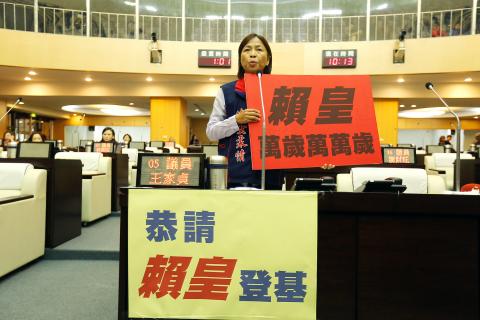Chinese Nationalist Party (KMT) Greater Tainan Councilor Hsieh Lung-chieh (謝龍介) yesterday accused Tainan Mayor William Lai (賴清德) and 20 local government officials of dereliction of duty, obstructing official business and violating the Local Government Act (地方制度法) after Lai and his administrative team’s no-show at an interim session of the council.
Lai had said on Jan. 6 that he would not attend any council meetings until the court has resolved allegations of vote-buying involving the election of Tainan Council Speaker Lee Chuan-chiao (李全教), a KMT member.
Lai said that, in the meantime, he would let residents directly supervise his performance and that he would take political responsibility for his actions.

Photo: CNA
Hsieh went to the Tainan District Prosecutors’ Office later yesterday and charged Lai with violating Articles 134 and 135 of the Criminal Code and Articles 48, 49 and 84 of the Local Government Act. He said that Lai and the officials’ failure to show up at the meeting ran counter to democratic procedures and might lead to a crisis in government.
He said that Greater Tainan Council Secretary-General Huang Kung-hsi (黃恭喜) had made repeated calls and KMT councilors Lu Kun-fu (盧崑福), Wang Chia-chen (王家貞) and others had attempted to visit the officials, but Lai and his team had been unreachable.
However, some legal experts questioned the validity of Hsieh’s move, saying that it is the Ministry of the Interior — not the court — that decides on issues pertaining to violations of the Local Government Act.
Some councilors also said that the Control Yuan should investigate Lai and other officials for allegedly interfering with the running of the local government because of “personal reasons.”
Lai traveled to Taipei yesterday morning to attend a Cabinet meeting, during which he suggested that the government establish a state-level examination center in southern Taiwan in response to an outbreak of avian influenza in the south.
Lai said that setting up such a center would be more effective than sending samples north for examination.
More than eight counties and at least 40 farms in the south have confirmed infections since the outbreak last week.
Tainan Deputy Mayor Yen Chun-tso (顏純左) and Tainan Secretary-General Chen Mei-ling (陳美伶) visited Siaying (下營) and Madou (麻豆) districts to oversee the culling of chickens infected by the virus.
Responding to questions about Lai’s absence at the council meeting, the local government said that on-site monitoring of the influenza spread was more important than meetings.
Hsieh said that if Lai did not see the error of his ways and chair meetings on how the local government should deal with the influenza outbreak, Lai was betraying the trust of the people who had placed their faith in him by electing him to office.
Additional reporting by CNA

CHAOS: Iranians took to the streets playing celebratory music after reports of Khamenei’s death on Saturday, while mourners also gathered in Tehran yesterday Iranian Supreme Leader Ayatollah Ali Khamenei was killed in a major attack on Iran launched by Israel and the US, throwing the future of the Islamic republic into doubt and raising the risk of regional instability. Iranian state television and the state-run IRNA news agency announced the 86-year-old’s death early yesterday. US President Donald Trump said it gave Iranians their “greatest chance” to “take back” their country. The announcements came after a joint US and Israeli aerial bombardment that targeted Iranian military and governmental sites. Trump said the “heavy and pinpoint bombing” would continue through the week or as long

TRUST: The KMT said it respected the US’ timing and considerations, and hoped it would continue to honor its commitments to helping Taiwan bolster its defenses and deterrence US President Donald Trump is delaying a multibillion-dollar arms sale to Taiwan to ensure his visit to Beijing is successful, a New York Times report said. The weapons sales package has stalled in the US Department of State, the report said, citing US officials it did not identify. The White House has told agencies not to push forward ahead of Trump’s meeting with Chinese President Xi Jinping (習近平), it said. The two last month held a phone call to discuss trade and geopolitical flashpoints ahead of the summit. Xi raised the Taiwan issue and urged the US to handle arms sales to

State-run CPC Corp, Taiwan (CPC, 台灣中油) yesterday said that it had confirmed on Saturday night with its liquefied natural gas (LNG) and crude oil suppliers that shipments are proceeding as scheduled and that domestic supplies remain unaffected. The CPC yesterday announced the gasoline and diesel prices will rise by NT$0.2 and NT$0.4 per liter, respectively, starting Monday, citing Middle East tensions and blizzards in the eastern United States. CPC also iterated it has been reducing the proportion of crude oil imports from the Middle East and diversifying its supply sources in the past few years in response to geopolitical risks, expanding

Pro-democracy media tycoon Jimmy Lai’s (黎智英) fraud conviction and prison sentence were yesterday overturned by a Hong Kong court, in a surprise legal decision that comes soon after Lai was jailed for 20 years on a separate national security charge. Judges Jeremy Poon (潘兆初), Anthea Pang (彭寶琴) and Derek Pang (彭偉昌) said in the judgement that they allowed the appeal from Lai, and another defendant in the case, to proceed, as a lower court judge had “erred.” “The Court of Appeal gave them leave to appeal against their conviction, allowed their appeals, quashed the convictions and set aside the sentences,” the judges